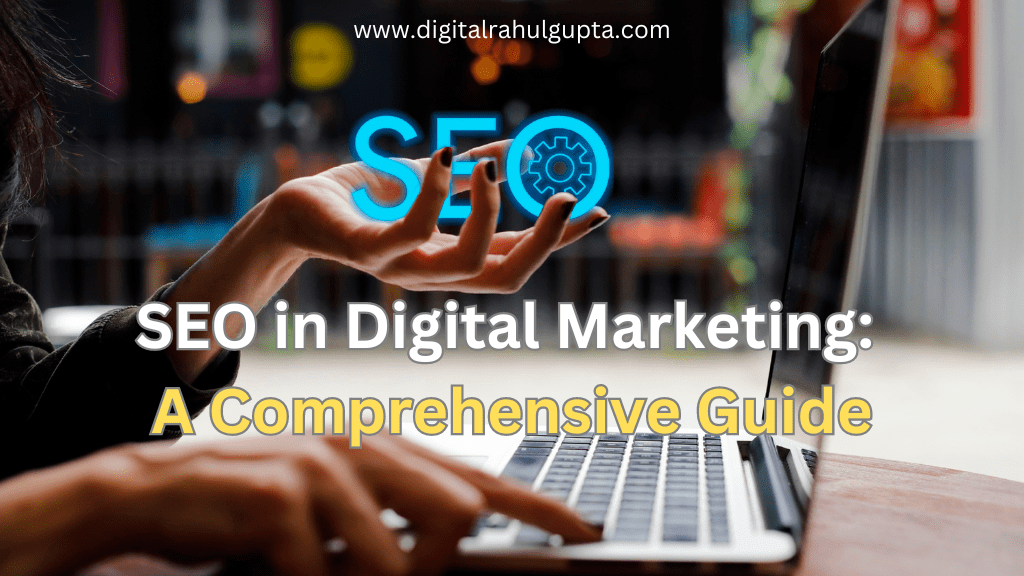What is SEO in Digital Marketing?
Search Engine Optimization, or SEO, is the practice of enhancing a website to increase its visibility when people search for products or services. It’s all about making your website more attractive to search engines so that it ranks higher in search results.
Importance of SEO in Digital Marketing
SEO is crucial in digital marketing because it drives organic traffic, which is both cost-effective and sustainable. Higher visibility on search engines translates to more visitors, which can lead to increased conversions and revenue.
Understanding SEO
SEO Definition
SEO stands for Search Engine Optimization, a method used to improve a website’s position on search engine results pages (SERPs) to gain more organic traffic.
Key Components of SEO
SEO involves various components including keywords, content, backlinks, and technical aspects like site speed and mobile-friendliness.
How SEO Works
Search Engine Algorithms
Search engines use complex algorithms to rank websites. These algorithms consider hundreds of factors to determine relevance and quality.
Crawling, Indexing, and Ranking
Search engines crawl the web to discover content, index it to understand what it’s about, and then rank it based on relevance to user queries.
Types of SEO
On-Page SEO
On-Page SEO focuses on elements within your website.
Title Tags
Title tags are crucial for SEO as they describe the content of a page to search engines and users.
Meta Descriptions
Meta descriptions provide a brief summary of a webpage and can influence click-through rates from search results.
Content Optimization
Optimizing content involves using relevant keywords and providing valuable information that meets user intent.
Off-Page SEO
Off-Page SEO refers to actions taken outside of your own website to improve its position in search rankings.
Backlinks
Backlinks from authoritative sites signal to search engines that your site is trustworthy and relevant.
Social Media Signals
Social media engagement can indirectly influence SEO by driving traffic and increasing visibility.
Technical SEO
Technical SEO ensures that a website meets the technical requirements of modern search engines.
Site Speed
Fast-loading sites provide a better user experience and can rank higher in search results.
Mobile-Friendliness
With the rise of mobile searches, having a mobile-friendly site is essential for SEO.
Structured Data
Structured data helps search engines understand your content better, potentially leading to enhanced search results.
Also Read : What is Social Media Marketing? A Comprehensive Guide
Benefits of SEO
Increased Visibility
Higher search rankings lead to greater visibility and more potential customers.
Better User Experience
SEO practices like improving site speed and mobile-friendliness enhance user experience.
Cost-Effectiveness
Unlike paid advertising, organic traffic from SEO is free and sustainable over the long term.
Long-Term Results
Investing in SEO can yield long-term benefits, maintaining traffic and rankings over time.
SEO Strategies
Keyword Research
Effective SEO starts with thorough keyword research to understand what your audience is searching for.
Tools for Keyword Research
Tools like Google Keyword Planner, SEMrush, and Ahrefs can help identify relevant keywords.
How to Choose Keywords
Choose keywords based on relevance, search volume, and competition. Focus on long-tail keywords for better targeting.
Content Creation
Creating quality content is vital for SEO success.
Quality Content
High-quality content answers user queries and provides value, which can increase engagement and shares.
SEO-Friendly Content
SEO-friendly content includes keywords naturally and is structured for easy reading by both users and search engines.
Link Building
Building a strong backlink profile is crucial for SEO.
Importance of Backlinks
Backlinks act as votes of confidence from other sites, boosting your site’s authority and ranking.
How to Build Quality Backlinks
Focus on earning backlinks from reputable and relevant websites through content marketing and outreach.
SEO Tools
Google Analytics
Google Analytics provides insights into website traffic and user behavior, essential for tracking SEO performance.
Google Search Console
Google Search Console helps monitor and troubleshoot your site’s presence in Google Search results.
SEMrush
SEMrush offers comprehensive SEO tools for keyword research, site audits, and competitive analysis.
Ahrefs
Ahrefs is a powerful tool for backlink analysis, keyword research, and content ideas.
Common SEO Mistakes to Avoid
Keyword Stuffing
Overusing keywords can harm your rankings and user experience.
Ignoring Mobile Optimization
Neglecting mobile optimization can lead to poor user experience and lower rankings.
Neglecting Content Quality
Low-quality content can reduce user engagement and hurt your SEO efforts.
SEO Trends in 2024
Voice Search Optimization
With the rise of voice assistants, optimizing for voice search is becoming increasingly important.
AI and Machine Learning in SEO
AI and machine learning are changing how search engines understand and rank content.
Core Web Vitals
Core Web Vitals focus on user experience metrics like loading speed, interactivity, and visual stability.
Case Studies
Successful SEO Campaigns
Examining successful SEO campaigns can provide valuable insights into effective strategies.
Lessons Learned from Failed SEO Strategies
Understanding why some SEO strategies fail can help avoid common pitfalls.
Conclusion
Recap of Key Points
SEO is a multifaceted approach that involves optimizing various aspects of your website to rank higher in search results.
Final Thoughts on SEO in Digital Marketing
Investing in SEO is essential for digital marketing success, offering long-term benefits and improved visibility.
Also Read : What is Digital Marketing? | How it work?
FAQs
What is SEO in digital marketing in simple words?
SEO is the practice of optimizing your website to rank higher in search results, thereby increasing visibility and traffic.
How does SEO improve website visibility?
SEO improves visibility by enhancing various aspects of your website, making it more attractive to search engines and users.
What are the main types of SEO?
The main types of SEO are On-Page SEO, Off-Page SEO, and Technical SEO.
Why is keyword research important for SEO?
Keyword research helps identify the terms your target audience is searching for, guiding your content and optimization efforts.
How often should I update my SEO strategy?
Regular updates to your SEO strategy are important to adapt to changing algorithms, trends, and user behavior.
